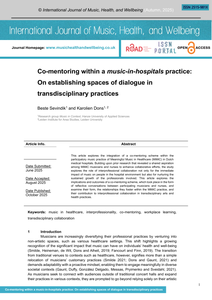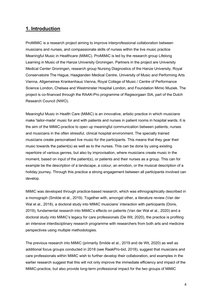This article explores the integration of a co-mentoring scheme within the participatory music practice of Meaningful Music in Healthcare (MiMiC) in Dutch medical hospitals. Building upon prior research that revealed a shared aspiration among MiMiC musicians and nurses to enhance collaborative efforts, the study explores the role of interprofessional collaboration not only for the immediate impact of music on people in the hospital environment but also for nurturing the sustained growth of the professionals involved. This article explores the implications and outcomes of a co-mentoring scheme, which took place in the form of reflective conversations between participating musicians and nurses, and examine their form, the relationships they foster within the MiMiC practice, and their contribution to interprofessional collaboration in transdisciplinary arts and health practices.
DOCUMENT

Professional Excellence in Meaningful Music in Healthcare (ProMiMiC) is het onderzoeksproject (2019-2023) naar persoonsgericht musiceren voor ziekenhuispatiënten en hun verpleegkundigen. In het onderzoek is de interprofessionele samenwerking tussen musici en verpleegkundigen onderzocht en is gekeken naar hoe persoonsgerichte (live) muziek kan worden ingezet als katalysator voor een compassievolle patiëntrelatie. Ook zijn modules voor onderwijs en professional development van musici en zorgprofessionals ontwikkeld. Het ProMiMiC consortium bestaat uit muziek- en ziekenhuiszorgpartners uit Groningen (met Hanzehogeschool als penvoerder), Den Haag, Wenen en Londen.
LINK

This document consists of the research report of Work Package 3 of ProMiMiC's locations Groningen and The Hague. Through the implementation of MiMiC-projects in the form of ‘living labs’, research data was generated leading to insights into (1) concepts of interprofessionality between musicians and healthcare professionals, (2) effects of the MiMiC-practice on nurses’ compassionate skills in contact with patients and (3) the influence of the various contexts on the MiMiC-practice. Given the fact that hospitals are the site of study in ProMiMiC, the research activities of Work Package 3 got highly affected by the COVID-19 pandemic. It led to additional questions and expansion of the MiMiC practice to directions that the consortium hadnot foreseen.--- Update September 2025: Chapter 5 - episodes added as a separate file for open access.
DOCUMENT

As the Dutch population is aging, the field of music-in-healthcare keeps expanding. Healthcare, institutionally and at home, is multiprofessional and demands interprofessional collaboration. Musicians are sought-after collaborators in social and healthcare fields, yet lesser-known agents of this multiprofessional group. Although live music supports social-emotional wellbeing and vitality, and nurtures compassionate care delivery, interprofessional collaboration between musicians, social work, and healthcare professionals remains marginal. This limits optimising and integrating music-making in the care. A significant part of this problem is a lack of collaborative transdisciplinary education for music, social, and healthcare students that deep-dives into the development of interprofessional skills. To meet the growing demand for musical collaborations by particularly elderly care organisations, and to innovate musical contributions to the quality of social and healthcare in Northern Netherlands, a transdisciplinary education for music, physiotherapy, and social work studies is needed. This project aims to equip multiprofessional student groups of Hanze with interprofessional skills through co-creative transdisciplinary learning aimed at innovating and improving musical collaborative approaches for working with vulnerable, often older people. The education builds upon experiential learning in Learning LABs, and collaborative project work in real-life care settings, supported by transdisciplinary community forming.The expected outcomes include a new concept of a transdisciplinary education for HBO-curricula, concrete building blocks for a transdisciplinary arts-in-health minor study, innovative student-led approaches for supporting the care and wellbeing of (older) vulnerable people, enhanced integration of musicians in interprofessional care teams, and new interprofessional structures for educational collaboration between music, social work and healthcare faculties.
Since 2015, the research group Lifelong Learning in Music of Hanze University of Applied Sciences Groningen, together with the University Medical Center Groningen (UMCG), has developed and researched the MiMiC practice for patients and nurses on surgical wards. The musicians make tailor-made music in the patients' rooms in collaboration with patients and nurses. They do this on the basis of verbal and non-verbal contact with patients and nurses. Person-centred music-making turns out to be easy to realise in a medical setting and to be meaningful for all involved. People who have just had surgery experience less pain. Nurses feel more deeply involved with their patients. Musicians show sensitivity for the social context in which they carry out their artistic practice.In this project the research group is developing an innovative artistic practice with a focus on elderly patients. Musicians work with patients and the care staff that are taking care of these patients during their stay in hospital. The research should lead to insights in the effects of this practice and to a new training for master students and professional musicians who want wish to specialise themselves in this field. Pilots on six different wards of the UMCG with professional musicians and master students are part of the research which will last two years in its entirety. The project has been granted funding from the 'Banning de Jong Fonds' of the national 'Prins Bernhard Cultuurfonds' and the 'Fonds Sluyterman van Loo'.
Het onderzoek Meaningful Music in Health Care (MiMiC) biedt kansen voor interprofessionele samenwerking van musici en verpleegkundigen. Daarnaast blijkt MiMiC ook tot een versterkt contact tussen patiënten en verpleegkundigen te leiden en tot een toename van compassie van verpleegkundigen. Wat houdt deze interprofessionaliteit precies in en hoe kan deze worden verder vorm krijgen?In Professional Excellence in Meaningful Music in Healthcare (ProMiMiC), beoogt een internationaal consortium van partners uit de muziekwereld en de gezondheidszorg de bestaande live muziek praktijk van MiMiC steviger te verankeren in ziekenhuiszorg. De partners bestaan uit instellingen voor muziekvakonderwijs en ziekenhuizen uit Groningen, Den Haag, Londen en Wenen.Samen hebben alle partners de expertise om praktijkgericht onderzoek naar professionalisering van deze muziekpraktijk uit te voeren. Daarmee kan een bijdrage geleverd worden aan ontwikkelingen als uitkomstgerichte zorg, positieve gezondheid, en een bredere maatschappelijke inzet van musici.Live muziek in het ziekenhuis? MiMiC - Meaningful Music in Health Care – is precies dat: een kleine groep musici die persoonsgerichte improvisaties voor patiënten en verpleegkundigen speelt. De musici maken op de patiëntenkamers muziek ‘op maat’, in interactie met de patiënten, op basis van hun voorkeuren, herinneringen, etc. Dit levert waardevolle momenten van esthetische ervaring en zingeving op, voor zowel patiënten als verpleegkundigen en musici.Sinds 2015 heeft het lectoraat Lifelong Learning in Music van de Hanzehogeschool Groningen samen met het UMCG de MiMiC-praktijk ontwikkeld en onderzocht voor patiënten van chirurgische afdelingen. Persoonsgericht musiceren blijkt goed te realiseren in een medische setting en voor alle betrokkenen zeer betekenisvol te zijn. Patiënten ervaren minder pijn en voelen zich beter. Daarnaast biedt deze innovatieve praktijk musici en verpleegkundigen nieuwe mogelijkheden om zich professioneel verder te ontwikkelen. Daartoe willen we ProMiMiC uitvoeren.ProMiMiC speelt in op de behoefte van musici en verpleegkundigen om beter samen te werken en daarin van elkaar te leren, alsook om persoonsgerichte live muziek te kunnen gebruiken als katalysator voor een compassievolle patiëntrelatie. Met de verdere professionalisering van musici en verpleegkundigen is de MiMiC praktijk geschikt voor brede toepassing in de ziekenhuiszorg. Daarmee kan een bijdrage geleverd worden aan ontwikkelingen als Uitkomstgerichte Zorg, positieve gezondheid, en bredere maatschappelijke inzet van musici.In het consortium zijn uit drie landen hooggekwalificeerde kennisinstellingen op het gebied van muziek en van zorg gebundeld. Samen hebben zij de expertise om in een rijke context toegepast onderzoek naar professionalisering in MiMiC uit te voeren. Dit leidt tot een verbeterde uitvoering van de MiMiC praktijk en hierop aansluitende scholing van studenten en professionals in muziek en zorg. Dit zal musici en verpleegkundigen in staat stellen excellente professionals te zijn m.b.v. gepersonaliseerde live muziek in de zorg.